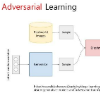Wearable sensor-based human activity recognition (HAR) has emerged as a principal research area and is utilized in a variety of applications. Recently, deep learning-based methods have achieved significant improvement in the HAR field with the development of human-computer interaction applications. However, they are limited to operating in a local neighborhood in the process of a standard convolution neural network, and correlations between different sensors on body positions are ignored. In addition, they still face significant challenging problems with performance degradation due to large gaps in the distribution of training and test data, and behavioral differences between subjects. In this work, we propose a novel Transformer-based Adversarial learning framework for human activity recognition using wearable sensors via Self-KnowledgE Distillation (TASKED), that accounts for individual sensor orientations and spatial and temporal features. The proposed method is capable of learning cross-domain embedding feature representations from multiple subjects datasets using adversarial learning and the maximum mean discrepancy (MMD) regularization to align the data distribution over multiple domains. In the proposed method, we adopt the teacher-free self-knowledge distillation to improve the stability of the training procedure and the performance of human activity recognition. Experimental results show that TASKED not only outperforms state-of-the-art methods on the four real-world public HAR datasets (alone or combined) but also improves the subject generalization effectively.
翻译:人类活动的识别(HAR)已经成为一个主要的研究领域,并被用于各种应用中。最近,深层次的学习方法随着人-计算机互动应用的开发,在HAR领域取得了显著的改进;然而,这些方法仅限于在标准共振神经网络过程中在本地社区运作,而不同传感器在身体位置上的关联被忽视。此外,由于培训和测试数据分布上的巨大差距以及不同学科之间的行为差异,它们仍然面临着业绩退化方面的重大难题。在这项工作中,我们提出一个新的基于变异器的反versarial学习框架,用于利用自学蒸馏(TASKEED)的可磨损传感器来识别人类活动。这些方法仅限于在标准的感应感应方向和空间及时间特征方面在当地社区运作。拟议方法能够利用对抗性学习多种主题数据集的交叉嵌入式特征表和最大平均值差异(MMD)的正规化,以调和多个领域的数据分布。在拟议方法中,我们采用了无师自学的自学自学自学框架,以便通过自学感知的感应感应感应感官感应感官的感官的感官的感官的感官的感官的状态,也只显示实际的状态。




